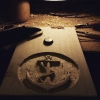When sharpening gouges by hand, slipstones are what you use on to create a bevel or remove any wire edge on the inside. The more contact you have between blade and slipstone, the quicker, smoother and more efficient you'll be.
Believe it or not, up until the time when I developed this range of slipstones with St Gorbain (Norton Pike) Abrasives, there were no slipstones specifically made for woodcarvers. We just used what we could buy or find - usually slipstones made for gunsmiths and the like, and megerly successful for us carvers. But now at last we have slipstones for woodcarvers, far better than any other available: versatile, efficient and with a great use of the material.
Although these slipstones have been around for a few years now, I haven't introduced them to Woodcarving Workshops - which is what I'm doing here! I/We don't sell these stones and have no say in the marketing or distribution. You will find them if you search online ('Chris Pye Slipstones') and they should be available from here:
Update 3 June 2019: These stones are no longer in production - they were a small item on Norton's huge inventory and they are doing some economic streamlining. There are still a few sets out there so grab them if or when you can! I am currently trying to find another manufacturer.
In the meantime, you will need to buy what slipstones you can find these will invariably be the tapered sort and not actually designed for especially for woodcarvers. But all is not lost! I started with those sorts of stones: coarse Carborundum and translucent Arkansas.

| 04 June 2021 20:05
I just came across these CBN rods for sharpening, which may be useful for anyone trying to sharpen inner bevels: https://woodturnerswonders.com/collections/featured-products/products/cbn-dowels?variant=40228189569191
They're on the large side, but I thought I'd pass along the information anyway.

| 25 April 2019 16:04
Hi Chris, Yes, indeed, I have noticed that they wear very quickly and get covered in grooves which can be delicate when you try and sharpen a tool with a straight edge.
Thank you for your quick reply.
Christopher

| 24 April 2019 11:47
Christopher - The main problem with waterstones is that they wear so quickly. They really work best with wide blades; a bevel of a carving gouge is relatively quite narrow and when rub from side to side - the normal way of sharpening a carving tool - you very quickly wear a groove. So you are continually having to flat. Oilstones last so much longer before the need to flatten.
Also there are so few suitable waterstone slipstones available.
But if you can use them successfully to correctly sharpen your tools,do go ahead and use them.

| 24 April 2019 05:41
Hello Chris,
I have noticed in your sharpening tutorials that you have a preference for 'oil stones' rather than 'wet stones' ( water wet...). Is there a reason for this? And do oil stones give a better finish?
Thanks
Christopher Pearson

| 05 November 2018 22:16
I have just purchased a set of Chris's 12mm signiture whetstones which have been delivered to Scotland from America of course there are shipping fees but I think it's worth it as I am trying to get back bevels on a set of Ashley isles chisels I received as a retirement present

| 19 February 2018 16:03
Richard - I'm afraid that I don't have anything to do with the supply or marketing and online searching would be what I'd have to do as well. You could try Saint Gobain
direct - phone: 508 795 2426.

| 19 February 2018 11:24
HI Chris
Thanks for your video on slipstones your designs look great and will save a lot of time in twiddling with ill fittings stones. Sadly I am finding trouble getting them from the suppliers mentioned and online searching has not helped so far. Do you know of any other suppliers who may have them or alternatively can I contact Norton pike direct and if so who should I be talking to.

| 24 March 2017 07:11
Thanks Chris, I thought that might be the case, thanks for the tip about angling the slipstone. The reason I asked was because my gouges came with a small arkansas slip stone, which has a much smaller curve than the majority of my gouges. I don't mind the extra effort for now, but will look into other slipstones in the future to make things a bit easier for myself! Oh, and no worries about the delay, I know you're a busy man! Regards, Russell

| 21 March 2017 09:33
Russell - I've only just seen your question and I do apologise for missing it and being so slow to reply.
You can certainly use narrower stones on wider tools though, as you say, it's more work. The curve of the slipstone mustn't be flatter than the sweep of the tool or you will run notches into the metal. Other than that, angle the slipstone as you move it across the blade and you will geometrically increase the surface contact.

| 21 March 2017 09:30
James - Bottom line you need 2 sorts of abrasive stones: coarse for shaping and fine for finishing. You need a benchstone in each. You also need slipstones in each.
My coarse benchstone is Norton Carborundum. My fine stone is a Translucent Arkansas. Slipstones are the sets I designed that I mention above.
There isn't really a 'set of everything'; you need to buy these things individually. Not everyone stocks everything so there is probably some hunting online to do. It may seem like they are expensive but once you have them you are set up for life as a carver/.

| 20 March 2017 21:11
Hi Chris, I have just bought a range of new tools and have my lime wood ready, but am stuck on what sort of stones to get so I can begin my commissioning. Is there a good starter set you can recommend?

| 25 April 2016 17:57
Hi Chris, are you able to use thinner stones to help shape and/or finish sharpening bigger (wider) tools? I know it would take much more time and concentration to ensure that everything is even, but if you only had thinner stones, could they be used?